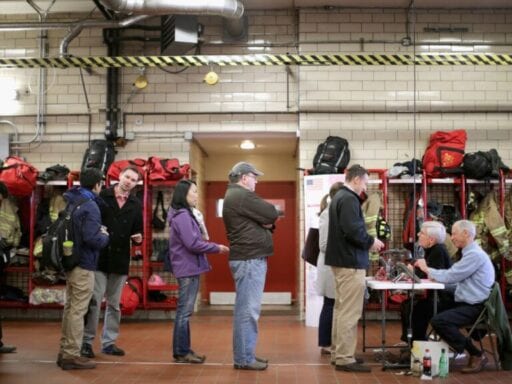Georgia and Louisiana are postponing their primaries. The four states voting Tuesday are not.
The spread of the novel coronavirus across the US is seriously complicating the Democratic presidential primary season.
On Saturday, Georgia announced it would postpone its March 24 primary, a move that followed Louisiana’s decision to move its April 4 contest — both states cited concerns over the spread of the coronavirus as the reason. Georgia moved its primary to May 19; Louisiana will hold its primary on June 20.
Despite this delay, the next set of primaries on Tuesday, March 17 — in Arizona, Illinois, Florida, and Ohio — are going ahead as scheduled. Election officials in all four states have argued that voting doesn’t pose a big risk of virus exposure, and pledged to take extra care to keep voting areas clean.
But the leaders of Louisiana and Georgia disagree.
Friday, Louisiana Gov. John Bel Edwards said concerns over the health of voters and volunteers led him to order a delay.
“The reasons include taking into account the older age of the majority of precinct volunteers and workers, and the need to reduce public contact, and also to allow maximum participation by all voters, regardless of their age and their health conditions,” Edwards said.
And Saturday, Georgia’s Secretary of State Brad Raffensperger said, “Events are moving rapidly and my highest priority is protecting the health of our poll workers, their families, and the community at large.”
But Arizona, Florida, Illinois and Ohio — each of which have multiple reported cases of coronavirus —are going ahead with their primaries. Secretaries of state from each of those states put out a joint statement on Friday explaining why:
Unlike concerts, sporting events or other mass gatherings where large groups of people travel long distances to congregate in a confined space for an extended period of time, polling locations see people from a nearby community coming into and out of the building for a short duration.
Further, guidance from voting machine manufacturers on how best to sanitize machines, guidance from CDC on best practices for hand washing, and guidance from our respective state health officials is being provided to every polling location.
Americans have participated in elections during challenging times in the past, and based on the best information we have from public health officials, we are confident that voters in our states can safely and securely cast their ballots in this election, and that otherwise healthy poll workers can and should carry out their patriotic duties on Tuesday.
From a public health perspective, there are some red flags in the statement.
Polling locations in the US often have long lines and can require voters to wait for hours. For example, people waited up to six hours to cast their ballots in Texas and California on Super Tuesday. That isn’t a short period of exposure.
Crystal Watson, a senior scholar at the Johns Hopkins Center for Health Security, told The Atlantic that the situation poses clear risks of spreading coronavirus. “When you bring people together in close proximity for extended periods of time, that is where you see explosions of disease. It’s tough to stay apart when you’re standing in a line,” she said.
The Centers for Disease Control and Prevention says that coronavirus passes commonly between people who are within about six feet of each other. That’s a greater distance than most people keep between each other in long lines, and not everyone who votes on Tuesday will be convinced that the coronavirus is a cause for concern or extra distancing.
The Atlantic reports that the states are taking steps to try to make voting booths hygienic and to protect election workers, and that Ohio has closed over a hundred polling locations that are near vulnerable populations, such as nursing homes.
But in a way those measures just demonstrate that the states are very much aware of how risky this is in the first place. If it’s too dangerous to let people vote near senior citizens — many of whom are the most active voters in American politics — then maybe that’s a sign that an alternate voting strategy, like the emergency vote-by-mail measure proposed by Sen. Ron Wyden (D-OR) might be wise to consider.
Author: Zeeshan Aleem
Read More



